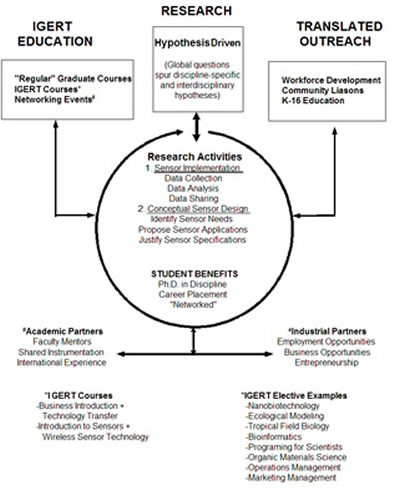What is IGERT?
IGERT stands for Integrative Graduate Education and Research Traineeship and is funded by the National Science Foundation. More details about IGERT programs across the country can be found at www.igert.org. Igert.org describes IGERT as “IGERT is the National Science Foundation's flagship interdisciplinary training program, educating U.S. Ph.D. scientists and engineers by building on the foundations of their disciplinary knowledge with interdisciplinary training.”
What is the EARS IGERT?
This Integrative Graduate Education and Research Training (IGERT) program represents an interdisciplinary, dual-institution (Kent State and Miami University) program focused on Environmental Aquatic Resource Sensing (EARS). The theme of EARS is training of doctoral students in environmental sensing, focused on freshwater resources, accentuated with business experiences, to develop professionals equipped for diverse careers.
What is the theme of EARS IGERT?
Inclusive, immersive student learning in environmental sensing; from a foundation in ecology and environmental science to sensor design and development to creation of sensor networks to analysis of data sets; accentuated with practical business experiences to develop environmental science professionals equipped for positions in academia or the private/public sector.
Who is eligible for EARS IGERT traineeships?
Traineeships are for doctoral students at Kent State or Miami majoring in one of the science disciplines represented by our faculty mentor pool. International students are not eligible. Trainees must be continuously supported by EARS IGERT for two years and must participate in all components of the program.
How much to IGERT traineeships pay?
From the igert.org web page: “The NSF contribution to graduate student stipends is currently $30,000 per year per IGERT trainee for a 12-month appointment. All IGERT-supported students are expected to be full-time IGERT trainees.”
How do I apply for EARS IGERT?
Students that wish to be considered for the EARS IGERT must also apply for graduate admission to the department in which they hope to major. In addition to completely the usual requirements for graduate school admission, EARS IGERT applicants must also complete the EARS IGERT application form found on our web page. For a student to be awarded a traineeship, they must be admitted into one of the participating departments and institutions. Applications for EARS IGERT can be downloaded from our web page (currently under development).
How can I determine which faculty are in the mentor pool?
A complete list of mentors is included on the EARS IGERT web page (presently still under development).
What are the unique educational components of the EARS IGERT?
As part of EARS IGERT, several courses and workshops will be developed, some of these are described below.
Business Introduction+ Technology Transfer will cover technology commercialization issues related to the difficulties of taking products to market that are not yet fully developed, as well as provide students an overview of the types of innovation systems used today. Guest speakers from the university and surrounding community will cover topics such as intellectual property, patent law, the role of universities in spinning-off new companies, and the overall properties of the technology marketplace.
The Introduction to Sensors+ Wireless Sensor Technology couplet focuses on sensors and will cover interfacing, communicating and collecting data from wireless sensors, establishing networks so that they coordinate with each other, and incorporation of firmware to implement various wireless network protocols. This course will be used to establish and instruct students in the use of the sensor training facility.
Introduction to Scientific Data Management + Data Analysis Methods is intended to provide instruction on modern day issues of managing and analyzing large amounts of scientific data.
What is the research focus of EARS IGERT?
We will follow the model of training doctoral students as junior colleagues. Thus, each trainee will select their own advisors from the mentor pool and develop, with appropriate advising, their own explicit, testable, and interesting scientific hypotheses that they will address during their dissertation research. In this way, upon graduation, students will have experienced all aspects of the scientific process, including the always challenging task of creating clear, compelling, and testable hypotheses. Given the diversity of our mentor pool, the role of sensors in a given student’s dissertation research will vary as dictated by the specific questions they seek to answer. In spite of this variation, however, each student will be well informed, as the result of the training experience, about sensors and their use, helping provide them with forward-looking skills for future careers. Specifically, some students will use current sensors or new arrays of current sensors to address their questions. Other students will work to develop new sensors, applications, and technologies. We anticipate that in some cases the full process of sensor development may extend beyond the PhD period and possibly carry some students into future careers in sensor development and applications.
What is the overarching EARS ecological research question?
Central Question: How does the impact of ecosystem subsidies vary across landscape gradients and temporal scales?
How do all the pieces of EARS IGERT fit together?
The schematic below illustrates the various components and their inter-connections.
 |

